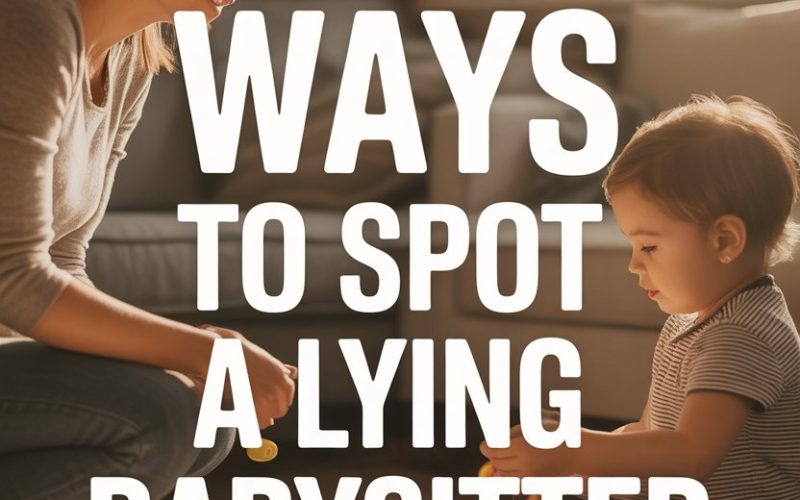Finding a trustworthy babysitter feels a bit like online dating: you hope the profile matches reality and no one’s using a filter that turns “responsible childcare provider” into “champion napper.”
Busy parents deserve honesty, but even the best references and glowing interviews can’t guarantee your babysitter is as truthful as Mary Poppins.
Spotting fibs early can be the difference between peace of mind and, well, finding biscuit crumbs in your bed for the third time this week.
Here are seven smart ways to catch a less-than-honest babysitter before things get out of hand.
1. Watch for Tall Tales About Your Child’s Day
The classic: “They ate all their veggies and took a three-hour nap!” – said no child ever. Tall tales about your little angel’s miraculous behaviour should raise an eyebrow or two.
If your child is suddenly the poster child for perfect nutrition and napping, but you’ve only ever witnessed them eat crackers and practice their trampoline skills on the sofa, something’s off.
Consistency is your friend. Ask specific questions about your child’s routine and see if your sitter’s answers match your own experience.
A friend once set a trap by leaving a half-finished puzzle out. When the sitter claimed it was all tidied, but the pieces were still scattered under the sofa, the writing was on the wall (and possibly the jigsaw pieces, too).
2. Notice Changing Stories or Vague Details
A confident babysitter will happily relay the day’s events with enough detail to make you feel like you were there – complete with snack reviews and sibling squabbles. But a babysitter who’s fibbing often fumbles when asked for specifics.
One day it’s a trip to the park; the next, it’s “just some crafts.” If you notice that stories change, become vague, or the sitter can’t recall basic details, it’s time to pay attention.
Experts in child safety like the American Academy of Pediatrics point out that reliable sitters should be able to clearly communicate what happened while you were out – sans hedging or creative license.
3. Keep an Eye on Physical Clues
Lying leaves clues, and not just in the form of mysteriously vanished biscuits. Shifty eye contact, forced smiles, or a sudden interest in your ceiling light can all be the body language of someone stretching the truth.
Kids can be surprisingly good snitches, but they’re not always reliable witnesses. Watch your sitter instead. Nervous laughter, defensive body posture, or a quick subject change when you ask about the day can all signal trouble.
Body language experts point out that while some people are naturally shy, unusual discomfort around direct questions is worth noting.
Also, evidence doesn’t lie. If you’re told the kids never left the lounge, but you find muddy shoes by the door and a trail of grass clippings, you’re not living with hobbits – just someone who’s been fibbing.
4. Be Wary of Over-the-Top Praise or Deflection
The over-complimenter deserves a place in the Babysitter Olympics. If every question you ask is met with gushing praise – “Your child is a genius! The most well-behaved! Never watched TV once!” – it’s time for your inner lie detector to beep.
Honest sitters know kids are a mixed bag. One moment they’re angels, the next they’re painting the cat purple. A trustworthy babysitter isn’t afraid to admit when things got sticky (sometimes literally).
If your sitter never reports a single hiccup, or skillfully changes the topic to you (“You’re such a great parent!”), they might be hiding the truth.
Some experts even suggest occasional negative feedback is a sign of genuine engagement – not incompetence.
5. Keep Lines of Communication Open with Your Child
Even if your child isn’t the world’s most reliable narrator (“She made me eat peas AND do maths!”), kids often reveal more than they mean to.
A simple “What did you do with the babysitter?” can unlock surprising detail – and sometimes, the truth. If the babysitter’s recap is “We read books,” but your child insists they played on your phone for hours, listen up.
Repeated inconsistencies between what your sitter says and what your child reports should get your attention, especially over time.
Keep the questions light and open-ended. Instead of “Did you brush your teeth?”, try “How did you brush your teeth tonight?”
Kids love a chance to tattle (or exaggerate), and you might gather clues about what’s really happening while you’re gone.
6. Test with Technology, But Don’t Become Big Brother
A discreet baby monitor or nanny cam can do wonders for your peace of mind.
These days, plenty of parents rely on a little tech backup – not to spy obsessively, but to check that their rules are being followed (and, occasionally, to prove that yes, the dog absolutely did eat the leftovers).
If your country or region allows it, consider letting your sitter know you use cameras in main rooms. Not only does this encourage honest behaviour, it gives you hard evidence if something doesn’t add up.
Keep in mind, privacy laws vary, so check what’s allowed in your area before putting up anything more elaborate than a baby monitor.
Tech can only do so much. The point isn’t to catch your babysitter plotting world domination, but to establish trust built on transparency.
7. Trust Your Instincts (and Your Network)
Gut feelings are powerful for a reason. You know your child, your home, and your expectations better than anyone else.
If something feels “off” – maybe your babysitter is always just a bit too eager to leave, or seems nervous around your friends – don’t ignore your inner warning bells.
Chat with other parents in your area. Social media groups, WhatsApp chats, and even the school gate can be goldmines for references and real-life stories.
If others have had the same “hmm” reaction about a sitter, you’re not alone.
You don’t need a law degree to spot a fibber. The best defence is a combination of vigilance, open dialogue, and a dash of common sense.
Even the most seasoned parent has hired someone who sounded perfect, only to discover their child’s new bedtime routine involved midnight snacks and “just one more episode.”
When to Make a Change
Nobody wants to believe their sitter is dishonest. But if the stories aren’t adding up, the biscuits keep vanishing, and you’re hearing more about screen-time than storytime, it’s time to act.
Sit down with your sitter, share your concerns, and see how they respond. Sometimes, a gentle nudge toward clear communication fixes everything. Sometimes, it doesn’t.
Your home, your rules. You deserve to feel confident that your children are in safe, honest hands – and to come home to a house that hasn’t mysteriously gained three extra empty crisp packets.
Trust your instincts, do your detective work, and may your next babysitter be as honest as your favourite childhood friend (minus the time they blamed your little brother for the missing biscuits).





